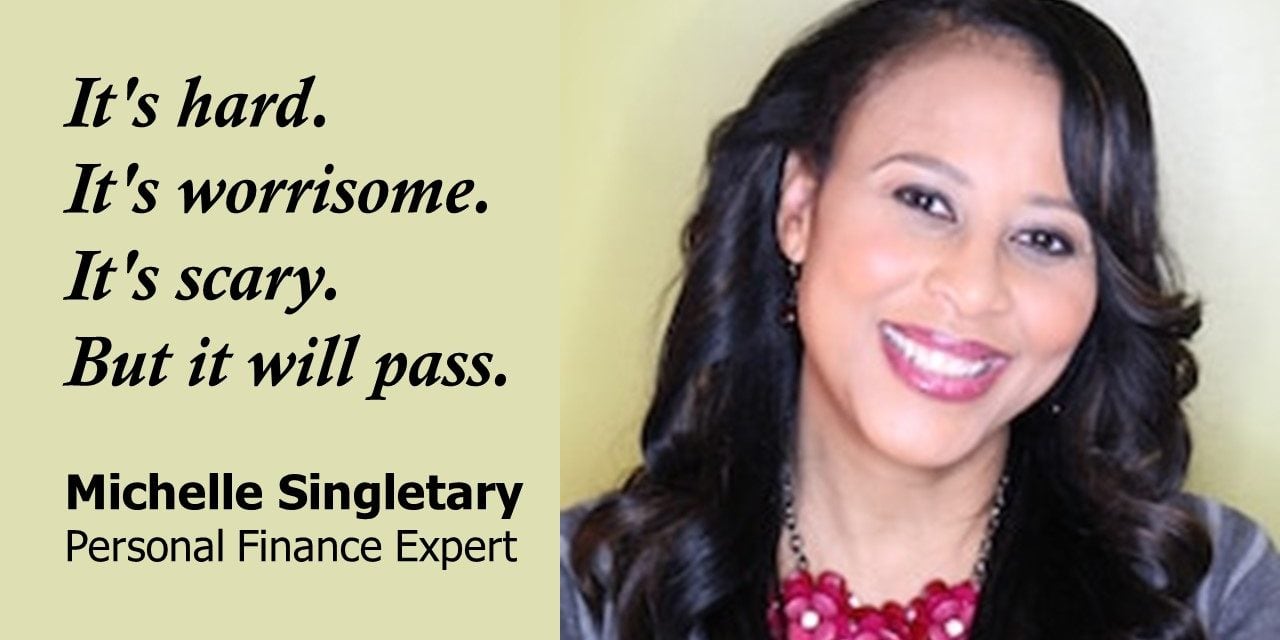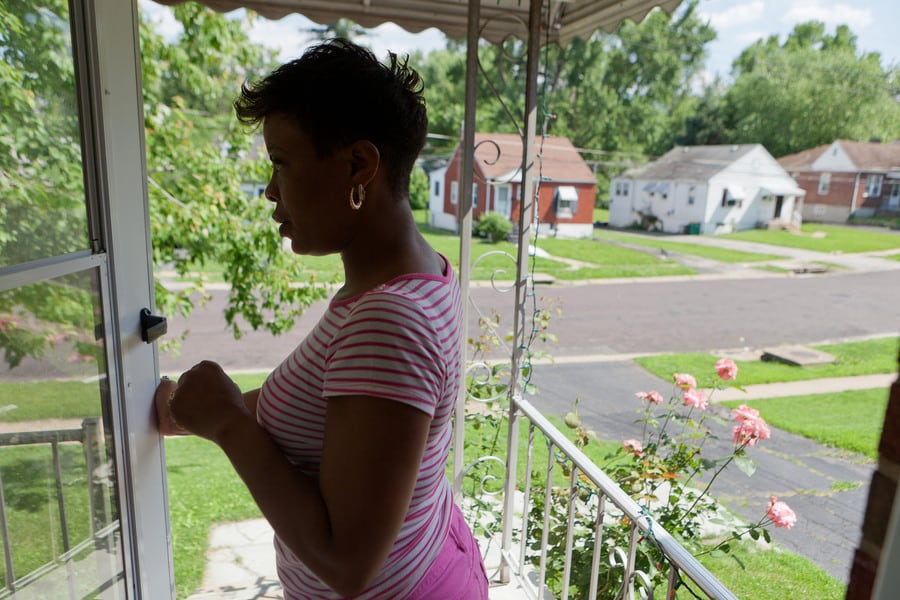Trying to figure out how to manage your money during the coronavirus pandemic? Personal finance expert Michelle Singletary has answers to your questions and encouragement that this, too, shall pass — whether you’re struggling with lost pay from COVID-19 cutbacks, wondering how best to spend your stimulus check, or thinking about retirement funds and other investments.
The award-winning columnist and author writes “The Color of Money” for The Washington Post. Every Wednesday and Sunday, readers turn to her nationally syndicated column as a trusted source of down-to-earth advice. Singletary takes the same approach in her books:
- The 21 Day Financial Fast: Your Path to Financial Peace and Freedom
- Spend Well, Live Rich: How to Live Well With the Money You Have
- Your Money and Your Man: How You and Prince Charming Can Spend Well and Live Rich.
Here’s Singletary’s advice for stretching your dollars during the pandemic and beyond as told to Fierce co-founder Yanick Rice Lamb.
Stocking Up on Food – and Cash
Obviously, people want to be careful about going out too much, and that’s the right thing to do. As a result, people tend to hoard a lot of things, but it’s not a great idea to have too much. You want to get enough for a week or two, but you don’t really need five gallons of mayonnaise or enough toilet paper to last you through next year. You also don’t want to keep money in these items that are going to be just sitting in your pantry or your refrigerator, because you may need it down the road to pay another bill.
Just be careful. Get what you need so that you don’t have to go out so frequently, but you don’t want to over-buy. Right now, cash is king and you want to make sure that you have a good cash reserve to pay your mortgage or your rent or utility or food down the road.
Dealing With Pay Cuts and Job Losses
It’s very difficult right now. If you were already living on the edge, you’ve probably fallen over –especially if you’ve lost your job or you’ve been furloughed. Look for community resources. If you belong to a church, find out what they’re doing to help. I know my church has been giving out groceries and helping people. This is the time to tuck your pride in, if you haven’t been the kind of person who would look for help. You want to ask for help from your circle of friends and family members. Everybody knows what’s going on and it’s okay to say: ‘Listen. I’m struggling here. Can you help me?’

If you haven’t lost your job, but you haven’t built up that emergency fund – you’re always like, ‘I will get to it; I will get to it – think about what you need to have for your financial security. That may mean not eating out as much or calling takeout. I know some people are ordering food to help local establishments, and that’s great. Use the money that you’re not spending to commute to work or on all the things that we did before this pandemic hit, and stockpile that money. Your job might be safe now, but it may not be tomorrow.
State and federal governments have a cash crunch as well, because people are not paying taxes. There’s less retail taxes, because people aren’t shopping. At some point, the states are going to have pull in and tuck in and that may mean furloughing some government workers.
All of us should be aware that our jobs are not as secure as we hope or think they are. Just make sure that you start stockpiling that savings and all that money that you’re not spending by not being out. If you still have your job and you can take extra debt payments. Get out of debt. Reduce that so if something happens, it’s one less thing that you have to pay if you lose your job oor you’re furloughed.
Spending Stimulus Checks
If you do not need to spend those checks for necessities – For many people, as soon as the stimulus check comes in the door, it’s going to go right out for the things that they need – food, utilities, paying rent.
If don’t need this money, yes, you should definitely save it. And I’ve heard some people are investing it. No. Right now, until we get past this, you need to stockpile — not just toilet paper — but cash.
Protecting Retirement Funds and Other Investments
Hopefully you had a good plan for your retirement. You looked at where you were; how risky you wanted to be. You’ve invested it wisely. It’s diversified. You can’t do anything right now. If you start moving things around and selling, you’re going to lock in the losses.
If your portfolio is down, it’s just on paper. You’re certainly feeling it, but you don’t realize those losses until you sell. So now is not the time to make massive moves that would result in locking in the losses — especially if you’ve got decades to retirement or even 10, 15 years to retirement. The market historically does come back, and so you’ve got to wait it out. It’s hard as you look at your portfolio, but stop looking. Every time you look, it raises your anxiety level.
Some people will think, ‘Well, you know, I’m only a couple of years from retirement,’ or ‘I’m retired. What do I do?’ The advice is actually still the same. If you’re retired, you most likely are going to live in retirement for another you know 15, 20 maybe even 30 years, so your portfolio will need some growth as well.
If you are overexposed in equities or stocks, and you are close to retirement or you’re retired, then you probably do need to do some shifting just to protect some of that money. It’s best to just talk to a financial planner who can help you figure out what to sell, what to keep so that you again minimize any losses that you would lock in.
Refinancing Your Home
It can work for some people. It’s going to be really hard to get your refinance package in anyway. The banks are just inundated with requests so it could take some time. If it’s going to cut your expenses and cut the time in which you have to pay the mortgage, sure. But just make sure you crunch the numbers. If you are already 10 or 15 years into a 30-year mortgage, you don’t want to be restart that. You’re going to erase any potential savings.
You can do a refinance by just making principal payments. If you put money on your principle and reduce the number of years you have that loan and the interest, that’s the same as doing a refi.
If you have a high interest rate, because maybe your credit wasn’t great — maybe it was 5% or 6% or even 7% and now it’s maybe 3% to maybe 4% — then it might be worth looking at a refinance to lock in lower rates. This gives you a little bit more breathing room, and you can make better headway on that loan.
Protecting Your Money by Avoiding COVID-19 Schemes
Don’t listen to anything. Don’t read texts. Don’t read an email. If you see anything that says COVID-19 and how to invest or how to save, just don’t open it. Don’t forward it to anybody. There’s nothing out there that is worth risking your finances on right now. So just rely on the credible news sources.
People are passing along text messages. Stop It! Don’t send anything to anybody. The scammers are out there looking for prey and maybe you won’t be susceptible, but you’ll pass along some incorrect information.
Even people I know are saying, ‘Oh I heard …’ No, you ain’t heard nothing! Don’t send or forward anything. Don’t try to profit from anything right now. It’s too dangerous. If I see anything in my subject head related to coronavirus or COVID-19, I just delete it immediately.
Recovering Down the Road
With this virus, the anxiety level is really high. People are understandably concerned, worried, and particularly because this economy is already probably in a recession and then we may have a long recovery, because we’ve have at this point like 26 million people applying for unemployment insurance. It’s hard. It’s worrisome. It’s scary, but it will pass. It will. What you have to do is take a look at your finances. See what you can do; cut back where you can.
If you’ve lost your job, seek help; ask for help. It may mean that you have to move. It may mean you can’t hold on to that house, but you can recover down the road. So just protect yourself and don’t try to hold on to something that you can’t afford. You just have to say in your heart that ‘this, too, shall pass; this too shall pass’ and just be smart.
And when you come out of it, the things that you promised to do to help make yourself better financially, just do it. Save more. Don’t spend more than your make – all these things that you have heard before and maybe didn’t listen to. Going through this storm, hopefully you have learned the lesson, and you’ll try to do better when we come out of the storm.








